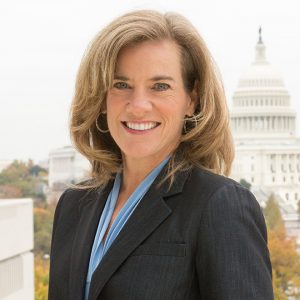
 By BJC General Counsel Holly Hollman
By BJC General Counsel Holly Hollman
For many reasons, it seems our work is getting more difficult. As BJC staff members talk to student groups, travel to speak at universities and participate in conferences, we often find confusion about religious liberty. Even among individuals and churches who have long supported our work, we hear worries about divisions. Friends are straining to hold on to the common ground we share as people who have fought for religious liberty. Regardless of the group to whom I’m speaking, I have learned not to assume much about the audience’s understanding and expectations of religious freedom. In the current environment, opinions are often shaped by emotionally charged — and often unnecessarily contentious — arguments surrounding recent challenges.
The BJC is responding to these increasing and difficult challenges. Many are particularly divisive, including conflicts over legislative proposals to protect civil rights and religious exemptions, deliberate efforts to exploit fears about religious minorities, and an intensity of partisan rhetoric that echoes in social media. We have maintained our commitment to a traditional understanding of religious liberty, informed by the lessons of history and a dedication to our values. We’ve stepped up our engagement to participate in each new debate, and it is clear that we must do more.
We have overcome threats to religious liberty in the past, including from candidates and elected officials who use religious differences or misleading rhetoric about the law to seek other agendas. But, it has become more difficult as we now face new threats from beyond our borders. As reported earlier this year, foreign entities are using our differences to harm us. The U.S. intelligence community found that Russia sought to undermine public faith in the U.S. democratic process and used particular issues to interfere with the 2016 presidential election. In its indictment of 13 Russian nationals, the U.S. Department of Justice found that religion was used to sow discord through fictionalized stories and social media accounts. The content included demonized images of Hillary Clinton, claims that President Obama wanted to convert American children to Islam and other conspiracy theories. While religion was not the only — or even primary — area of focus, it is striking that our religious diversity would appear to provide fertile ground for those seeking to pick at our vulnerabilities, stoke fears and undermine our institutions.
Though they used a wide variety of means to sow discord, the foreign actors’ investment in social media certainly magnified and multiplied their efforts. Even before the reports of Russian interference, plenty had been written about the dangers of false news reports circulating on social media. The problem cuts across all demographics and should be particularly alarming for religious people. As Wheaton College’s Ed Stetzer has urged, Christians — as people of truth — should be especially cautious on social media. I agree with his advice that we should guard our integrity by never sharing what we can’t verify and apologizing when we are wrong.
The Russia indictments tell us that we may be even more vulnerable than we think. The stakes are getting higher as social media becomes more integral to our lives as a means for information and interaction with others. As our divisions seem to cut deeper — not only along geographic and party lines, but within local communities, denominations and families — it is not enough to defend ourselves against misinformation and manipulation. We need to be more connected to each other as human beings, not divided based on our worst stereotypes. When it comes to religious liberty, we need listen to each other, seek understanding and reclaim a vision that can bridge our divisions and protect religious liberty for all.
I don’t think it has ever been easy. But the effort is worth it. I believe that most Americans would agree that working to defend and extend religious liberty for all, as the BJC’s mission demands, is vital, important work. It reflects a fundamental promise of our American constitutional tradition. For historic Baptists, religious liberty is also a defining aspect of faith, crucial to our understanding of God who created us free and responsible.
We should revisit old lessons but also be willing to learn new ones. We must tell our stories truthfully and listen to each other with compassion. Only through understanding what divides us can we find common ground in our religious liberty tradition like Americans did before us. With that, our tradition can continue to be a source of strength, not a weakness to be exploited.
This article appeared in the March/April 2018 edition of Report from the Capital. You can also read the digital version of the magazine or view it as a PDF.




